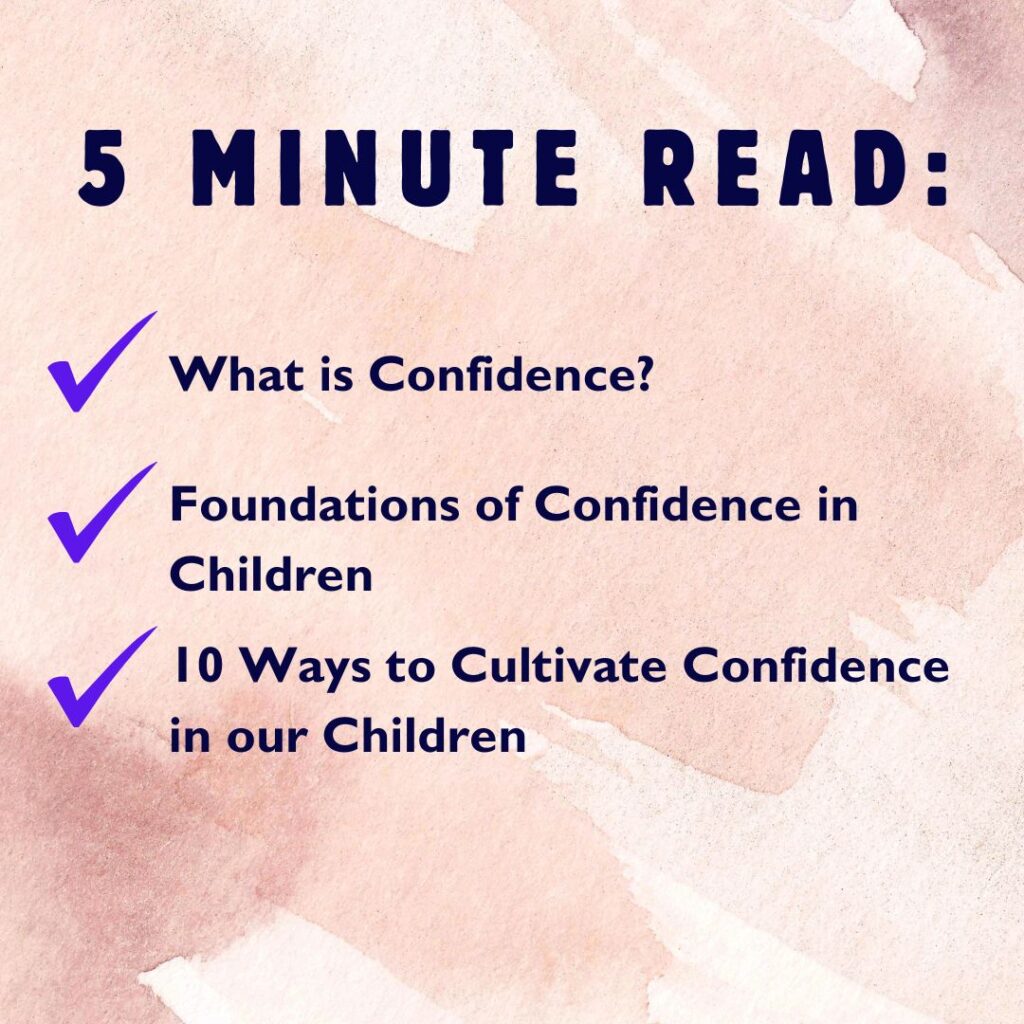happy Little moments





Building Confidence in kids
Today, let’s talk about building confidence in our kids. Confidence is a quality that helps our children stand tall, tackle challenges head-on, and bounce back from setbacks like a pro. We all want our kids to grow up feeling capable and resilient, ready to take on whatever curveballs life throws their way.
Confidence isn’t just about feeling good about ourselves or having high self-esteem; it’s a vital life skill that shapes every part of our child’s development. A confident child is more likely to embrace challenges, explore new opportunities, and thrive even when the world feels a bit unfair. So, let’s dive into some ways we can nurture this essential trait in our kids!

What is Confidence?
It’s important to remember that confidence is more than just a child’s self-esteem. Self-esteem refers to someone’s self-love, self-worth, or their own value. A child with low self-esteem may struggle with self-worth or their own value as they enter adulthood.
This is dangerous because an adult with low self-esteem may put up with relationships, jobs, or positions in life that are unhealthy. Self-esteem is extremely important, but it’s really only part of the full picture of having self-confidence.
While things such as positive self-talk and affirmations are incredibly important to raising a child with high confidence, that’s really only a piece of the confidence puzzle.
Confidence also encompasses someone’s ability to be resilient and learn from their mistakes. A confident child will try new things without fear of failure. (Fear of failure is a learned behavior). They can handle constructive criticism and can maintain positive relationships.
Confidence also gives people the ability to stand up for themselves and others, creating the necessary quality of courage.
These are all amazing qualities for a child to have throughout their life.

Foundations of Confidence in Children
Confidence is not a quality that is encompassed by only one thing. It’s the collective of several positive qualities that a child (or anyone) must develop to have it. Many of us view confidence as something someone has or doesn’t. We may not even know clearly what it is, but we know it when we see it. We don’t always have a clear, definitive answer about what confidence is because it’s built on several varying factors. Some people may possess some or all of these qualities as we define as confidence:
- Secure Attachment: Children with a secure attachment to a parent or caregiver are more likely to explore and take risks. Exploration and risk-taking are important parts of child development, and especially for developing confidence.
- Competence: As children learn new skills, they gain a sense of competence that boosts their confidence.
- Resilience: The ability to bounce back from setbacks is crucial for maintaining confidence in the face of challenges.
- Self-awareness: Understanding one’s strengths, weaknesses, and emotions contributes to a realistic self-image.
- Positive self-talk: The internal dialogue children have with themselves significantly impacts their confidence levels. It’s important to remember that often your voice will become a part of your child’s inner dialogue one day. While children may need us to be firm at times, we must also keep the way we talk to our children kind and respectful.
10 Ways to Cultivate Confidence in our Children
1). Provide Unconditional Love and Support
The ultimate foundation of confidence is having people around you who love, support, and value you. This is regardless of any mistakes or achievements you’ve made. This is no different with children and is directly related to developing a secure attachment with your child. Make sure your child knows that your love is unconditional
2). Encourage Your Child’s Independence and Problem-Solving.
Unfortunately, we can’t do everything for our children. We can’t solve all of their problems, nor should we. If we take care of their problems for them, we take away their confidence and abilities. Allow them to have independence in their daily tasks, as much as possible. Encourage them to find solutions to their own problems before stepping in to save them. The more they learn that they can make their own decisions and solve their own problems, the more confident they will become in themselves.
3). Set Realistic Goals for Them.
Help your child set achievable goals and work toward them. If it’s a larger goal they would like to achieve, break the goal up into smaller steps to create small wins along the way. If there are setbacks or failures along the way, it’s important to reframe those obstacles as just a part of the journey. Make sure to celebrate their progress along the way.
4). Give your child opportunities for success.
Create an environment where your child can experience success regularly by providing challenges that are within their reach. Find their strengths and interests and give your child opportunities to develop in those areas. As adults, we often overlook our own strengths because those gifts come naturally to us. Show your child what theirstrengths are and introduce new challenges in those areas, building on existing skills.
5). Teach your Child a Resilience and Growth Mindset
Confidence isn’t about never failing at something. It’s, in fact, often it’s quite the opposite. Having confidence is knowing that if you fail, you can always learn something from the experience. If your child doesn’t succeed at something, encourage them to view their mistakes as learning opportunities for growth. You can also use phrases such as, “You haven’t mastered this yet, but you’re improving.” You can also help your child find strategies for improvement after a setback. A child who sees challenges as opportunities for growth rather than threats to their self-worth will be more confident in tackling new experiences.
6). Provide Positive and Specific Feedback
Part of building a growth mindset in children is learning how to effectively praise our children. Try to focus praise on effort or progress. Instead of saying, “You’re so smart,” try saying something like, “I’m impressed by how hard you worked on that math problem.” Be sincere with your praise and be careful not to compare siblings or peers.

7). Help your Child Develop Strong Social Skills
Learning to have confidence in social situations is crucial to building your child’s self-esteem. Have playdates with their friends, show them good communication skills, and encourage them to play in team sports or activities. These are all fantastic ways to build those relationships and social skills in your child over time.
8). Encourage Healthy Risk-Taking
Confidence grows when children step out of their comfort zones and take on new challenges. I know from personal experience, how nerve wracking it can be to watch your preschooler climb on playground equipment! But encouraging healthy risk-taking is important to your child’s development. Encourage your child to try new activities. Teach them how to assess the risks around them and make a wise decision about whether or something is safe. Celebrate their courage when they face their fears. You may even be able to share your own experiences about taking risks and what you learned during those moments.
9). Model Confidence and Self-Care
Children learn so much by watching their parents. They’re always watching and modeling our behaviors. It’s important to model confidence and self-care in your own life. Speak positively about yourself and your own abilities. Show your children that you take on challenges with a positive attitude. Admit when you make a mistake and explain what you learned from the experience. By showing them what confidence looks like, your child will internalize your attitude and behavior when it comes to challenges and building their own self-confidence.
10). Create a Positive Home Environment.
The atmosphere at home plays a significant role in shaping a child’s confidence. As a parent, establish clear and consistent rules and consequences. If a child doesn’t know what the rules or expectations are at home, it’s difficult for them to meet your expectations. This, in turn, leads to lower self-esteem and confidence overall. Instead, minimize criticism and try to focus on giving your child constructive feedback. A home where a child feels safe, valued, and heard is a fertile ground for confidence to grow.
Building Confidence is a lifelong journey
Building confidence in kids is not a one-time task but a continuous process that evolves as your child grows. It requires patience, consistency, and a willingness to change your approach as your child’s needs change. Remember that every child is different. What works for one child may not work for another. Be patient with yourself and your child as you work together.
By applying these strategies and giving your child a supportive and loving environment, you’re laying the foundation for your child to take on the world with confidence. The work that you do today will shape your child’s present and future, as well.
Building confidence is one of the greatest gifts you can give your child. Sowing the seeds of confidence will continue to benefit them throughout their life, empowering them to go for their dreams, overcome challenges, and live a fulfilling life. Remember that you’re not just raising a child; you’re raising a future adult who will carry the confidence you’ve instilled into every aspect of their life.
